#armenian myth
Text

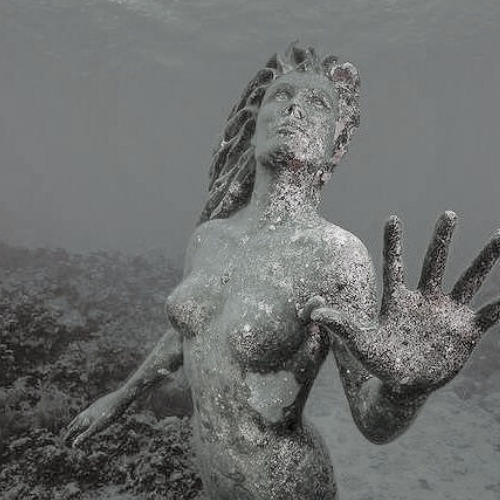







armenian mythology: tsovinar
tsovinar is the goddess of the sea, rain, and water. she is a fierce goddess, who forces the rain to fall from the heavens with her fury.
242 notes
·
View notes
Text
So.
I’m not Jewish. As you know. (I was raised Catholic if you’re curious. But that’s not strictly relevant to this post)
But, speaking as someone who has a degree in history and who has read up a LOT about the Holocaust (and the Armenian Genocide).
I can’t help but find The Boy in the Striped Pajamas to be a shameful piece of work.
(I like how the kid refers to Hitler as The Fury but that’s it)
Now I have no issue with writing fiction about a genocide. None at all. The Forty Days of Musa Dagh by Franz Werfel springs to mind as well as Maus, among others.
That is not the issue here.
Rather it comes from other aspects of the work.
(WHAT DO YOU MEAN THE AUTHOR WROTE A SEQUEL????????!!!!!!!!!)
For one, there are quite a few historical inaccuracies. Normally I can look past such things in fiction, but NOT when it comes to subjects like genocide or persecution.
Doing this risks spreading disinformation, misconceptions or LIES!
As well as a false equivalency between the victims and perpetrators of genocide.
It fuels the disgusting myth that the German people were completely in the dark about the Nazi persecution of Jews (and others like Romani people), they weren’t.
Sure they didn’t have all the facts but they knew for DAMN aside that Jews were being sent away and killed somewhere.
In turn this feeds the myth of the German people bearing little to no responsibility for the genocide and that they were brainwashed.
Endearing sympathy to them in turn. Which isn’t a good idea in my mind. Oh no. This leads to absolving them of any blame.
While there was propaganda and indoctrination the fact remains that many people were more than willing to be complicit in such atrocities. (No I wouldn’t, get off your high horse!)
These myths and misconceptions have become QUITE widespread and have done immense harm to Holocaust education and perhaps even to genocide studies as a whole.
And one can’t forget how the book tries to make one feel sympathy for Nazi SS officers and prison guards. BAD idea!
And no I’m not calling for anyone to harass the author of the book. That’ll only lead to trouble.
I just felt like I had to say this much.
Again I’m no expert.
I’m just working with what I know.
I’ll leave a few articles below sharing my sentiments, they might articulate my points better.
Feel free to reblog.
#dougie rambles#personal stuff#political crap#literature#history#the holocaust#genocide#academics#vent post#myths#lies#misconceptions#bullshit#the boy in the striped pajamas#i feel sick#armenian genocide#historical inaccuracies#education#persecution#ignorance#feel free to reblog#reblog this#reblog the shit out of this#false equivalence#rant#long post#antisemitism#tw antisemitism mention#jewish history#european history
23 notes
·
View notes
Text

Alongside storms, they either fly skyward from the earth or earthward from the sky.
#BriefBestiary#bestiary#digital art#fantasy#folklore#legend#myth#mythology#dragon#monster#vishap#armenian mythology#armenian folklore#vahagn#vahagn vishapakagh#mount ararat
27 notes
·
View notes
Text
Semantics or genuine misunderstandings?
I keep feeling such… depression, I guess? Anger ain’t the right word, nor is sadness. It’s just an all encompassing defeat kind of feeling when I see someone defend their position on an important topic by pretending only the most egregious kind of idiotic arguments against their position are the other side.
The specific instance for this right now is seeing people act like anti-Zionism means anti Jew ignoring the multiple meanings of the word. And then do things such as act like the only way people could side with Palestinians (they usually just say Hamas and limit how often they say the name of the people group being oppressed… wonder why) is if no Israelis were harmed October 7 2023. Bru, some people are malicious idiots that think this way, but I and many people who don’t believe in reactionary group punishment (war crimes) don’t need to ignore the rape and murder and etc of Israelis on October 7 to know two wrongs don’t make a right.
And underneath it all is a failure to engage with the biggest and most salient point of the “side” they rail against; why do people in the West Bank deserve to have their homes taken over and themselves violently thrown out by Israeli settlers? Oh that’s already been happening for 75 years? Seems like you’re ignoring the real issue then. Hamas will always have recruits as long as the Palestinians are treated as sub humans who cannot have freedom of movement, cannot have freedom to keep their stuff or their lives. This applies to Gaza as well, but it’s curious that even with the two step of “they killed and raped civilians! So of course we must snipe grandmas in the streets and in mosques and churches while pillaging and raping in the rubble!” they can’t engage with the fact that they’ve tied their idea of their own and their group’s safety to the genocide of the outgroup. And that on top of that they misuse accusation of antisemitism to hide from this reality like some kind of American Christofascist would, or Russian propagandist, or Azeri nationalist.
But this reality levels their whole wordview, not just argument. They need the delusion of settlers stealing land and houses and soldiers sniping old women and children and denying food, clean water and healthcare to somehow being necessary to combat Hamas… cause otherwise you’d have to admit you are supporting a government that is trying to speed run the American genocide of native Americans. We, Americans, didn’t have to fully regime change or do anything to Iraq to fight terrorism or to keep ourselves safe. More people should’ve listened to how this was reactionary “spill more of their blood to salve our wounded pride and the hearts of those who died in the towers!!!!!!!!” bullshit, but they didn’t. What Israel did and does to Palestinians before October 7 and since makes all of the Levant less safe. Just like with counter terrorism, war and war crimes actually make the problem worse and soft power non military solutions are the actual defenses
#I want to believe these people have just only seen the actually anti semitic people using this anti genocide moment to try to rant openly#But Zionist can mean a bunch of things#And if that or Palestinian rights or being anti genocide is equated to automatically being anti semitic#Me thinks y’all subconsciously know Arendt was right#The USA has myths that people here refuse to unlearn to keep their put upon world view#And they are built upon straw man arguments and all kinds of fallacies#Israel does as well#The government of Israel is an oppressive force#Just like the US government#Both have always been so#Accepting this is paramount to actually fixing that#Otherwise I guess get used to Israel sliding toward their own version of Orbanism#Aka “it’s still technically a democracy cause there’s lots of steps stripping the people who would vote us out of power from having#The ability to!#Palestinian genocide#looks a lot like what the Azerbaijani gov’t is doing to Armenians
5 notes
·
View notes
Text
When I refer to zionists as textbook genocide denialists, btw, I'm talking about literal textbooks I was assigned in my genocide studies classes. Here's an excerpt from one, Genocide: A Comprehensive Introduction by Adam Jones, detailing common genocide denialist arguments. I've bolded arguments that I've personally heard from zionists (including ‘neutral’ fence-sitters, who are on the side of the oppressor by default) — during the current Gaza genocide, but also in reference to the entire history of the genocidal zionist occupation. It's important to learn to recognize these arguments and call them what they are, genocide denial, rather than excusing denialists as simply misinformed or misguided.
"Among the most common discourses of genocide denial are the following:
'Hardly anybody died.'
Reports of atrocities and mass killings are depicted as exaggerated and self-serving. ... Photographic and video evidence is dismissed as fake or staged. Gaps in physical evidence are exploited, particularly an absence of corpses. Where are the bodies of the Jews killed by the Nazis? (Incinerated, conveniently for the deniers.) Where are the bodies of the thousands of Kosovars supposedly killed by Serbs in 1999? (Buried on military and police bases, or dumped in rivers and down mineshafts, as it transpired.) When the genocides lie far in the past, obfuscation is easier. Genocides of indigenous peoples are especially subject to this form of denial. In many cases, the groups in question suffered near-total extermination, leaving few descendants and advocates to press the case for truth.
'It was self-defense.'
'The onset of [genocidal] killing,' wrote Jacques Sémelin, 'almost always seems to involve this astounding sleight of hand that assimilates the destruction of civilians with a perfectly legitimate act of war. From that moment on, massacre becomes an act of self-defense.' Murdered civilians - especially adult males – are depicted as 'rebels,' 'brigands,' 'partisans,' 'terrorists.' The state and its allies are justified in eliminating them, though unfortunate 'excesses' may occur. Deniers of the Armenian genocide, for example, play up the presence of armed elements and resistance among the Armenian population – even clearly defensive resistance. ... Genocide may also be depicted as an act of pre-emptive self-defense, based on atrocities, actual or alleged, inflicted on the perpetrator group in the past – sometimes the very distant past. Sémelin, for example, has explained Serbs’ 'insensitivit[y] to the suffering they caused' in the Balkan genocide of the 1990s in terms of their inability to perceive any but 'their own woes' ... A substrategy of this discourse is the claim that 'the violence was mutual.' Where genocides occur in a context of civil or international war, they can be depicted as part of generalized warfare, perhaps featuring atrocities on all sides. This strategy is standard among the deniers of genocides by Turks, Japanese, Serbs, Hutus, and West Pakistanis – to name just a few. In Australia, Keith Windschuttle used killings of whites by Aboriginals to denounce 'The Myths of Frontier Massacres in Australian History.' ... Sometimes the deniers seem oblivious to the content of their claims, reflecting deeply embedded stereotypes and genuine ignorance, rather than malicious intent – as with the CNN reporter who blithely referred to the world standing by and 'watch[ing] Hutus and Tutsis kill each other' during the Rwandan genocide of 1994.
'The deaths weren’t intentional.'
The difficulties of demonstrating and documenting genocidal intent are exploited to deny that genocide occurred. The utility of this strategy is enhanced where a longer causal chain underpins mass mortality. Thus, when diverse factors combine to cause death, or when supposedly 'natural' elements such as disease and famine account for many or most deaths, a denialist discourse is especially appealing. It buttresses most denials of indigenous genocides, for example. Deniers of the Armenian and Jewish holocausts also contend that most deaths occurred from privations and afflictions that were inevitable, if regrettable, in a wartime context – in any case, not genocidal.
'There was no central direction.'
Frequently, states and their agents establish deniability by running off-duty death squads, or employing freelance forces such as paramilitaries (as in Bosnia-Herzegovina and Darfur), criminal elements (e.g., the chétés in the Armenian genocide), and members of the targeted groups themselves (Jewish kapos in the Nazi death camps; Mayan peasants conscripted for genocide against Mayan populations of the Guatemalan highlands). State attempts to eliminate evidence may mean that documentation of central direction, as of genocidal intent, is scarce. Many deniers of the Jewish Holocaust emphasize the lack of a clear order from Hitler or his top associates to exterminate European Jews. Armenian genocide denial similarly centers on the supposed freelance status of those who carried out whatever atrocities are admitted to have occurred.
'There weren’t that many people to begin with.' [*]
Where demographic data provide support for claims of genocide, denialists will gravitate towards the lowest available figures for the targeted population, or invent new ones. The effect is to cast doubt on mortality statistics by downplaying the victims’ demographic weight at the outbreak of genocide. This strategy is especially common in denials of genocide against indigenous peoples, as well as the Ottoman genocide of Christian minorities.
'It wasn’t/isn’t genocide, because ...'
Here, the ambiguities of the UN Genocide Convention are exploited, and combined with the denial strategies already cited. Atrocious events do not qualify as 'genocide' … because the victims were not
members of one of the Convention’s specified groups; because their deaths were unintended; because they were legitimate targets; because 'only' specific sectors of the target group (e.g., 'battle-age' men) were killed; because 'war is hell;' and so on.
'We would never do that.'
Collective pathological narcissism occludes recognition, or even conscious consideration, of genocidal culpability. When the state and its citizens consider themselves pure, peaceful, democratic, and lawabiding, responsibility for atrocity may be literally unthinkable. In Turkey, notes Taner Akçam, anyone 'dar[ing] to speak about the Armenian Genocide ... is aggressively attacked as a traitor, singled out for public condemnation and may even be put in prison.' In Australia, 'the very mention of an Australian genocide is … appalling and galling and must be put aside,' according to Colin Tatz. 'A curious national belief is that simply being Australian, whether by birth or naturalisation, is sufficient inoculation against deviation from moral and righteous behaviour.' Comedian Rob Corddry parodied this mindset in the context of US abuses and atrocities at Abu Ghraib prison near Baghdad. 'There’s no question what took place in that prison was horrible,' Corddry said on The Daily Show. 'But the Arab world has to realize that the US shouldn’t be judged on the actions of a ... well, we shouldn’t be judged on actions. It’s our principles that matter, our inspiring, abstract notions. Remember: just because torturing prisoners is something we did, doesn’t mean it’s something we would do.'
'We are the real victims.'
For deniers, the best defense is often a strong offense. With its 'Day of Fallen Diplomats,' Turkey uses Armenian terrorist attacks against Turkish diplomatic staff to pre-empt attention to the Turkish genocide against Armenians. In the case of Germany and the Nazi Holocaust, there is a point at which a victim mentality concentrating on German suffering leads to the horrors that Germans inflicted, on Jews and others, being downgraded or denied. In the Balkans, a discourse of genocide was first deployed by Serb intellectuals promoting a nationalist–xenophobic project; the only 'genocide' admitted was that against Serbs, whether by Croatians in the Second World War (which indeed occurred), or in Kosovo at the hands of the Albanian majority (which was a paranoid fantasy). Notably, this stress on victimhood provided powerful fuel for unleashing the genocides in the first place."
* Zionists make two demographic claims to deny genocide, and specifically to deny the Nakba: the first parallels what Jones says here — that there weren't many (or even any) Palestinians ("Arabs") in Palestine to begin with, and/or mass expulsions were actually voluntary migration. The second is a reversal, where zionists point to demographic data and claim that Palestinian population growth must mean genocide never occurred (as if genocide survivors aren't capable of having children). For further reading on Nakba denial specifically, Nur Masalha's work is a good place to start, especially The Palestine Nakba (2012), Politics of Denial (2003), A Land Without A People (1997), and Expulsion of the Palestinians (1992).
160 notes
·
View notes
Note
I saw your post about why so many cultures have flood myths, so I figured you would be a good person to ask this question to:
Why are there a lot of "Storm deity faces Dragon" myths ? Susanoo vs Orochi, Thor vs Jörmungandr, the Armenian storm-god Vahagn being literally nicknamed the Dragon-Slayer, Lotan vs Hadad, and Zeus vs Typhon if you consider him a dragon (which I do), Tezcatlipoca vs Quetzalcoatl …
It's weird, considering this spans from Japan to Germany, and that, to throw off the whole pattern, Kirimu the Dragon is the blood-brother of Nkuba, the Nyanga lightning god, rather than his enemy
Literally I think it's that storm deities are usually badasses. Dragons are also badass, and it's cool when they fight.
2K notes
·
View notes
Text


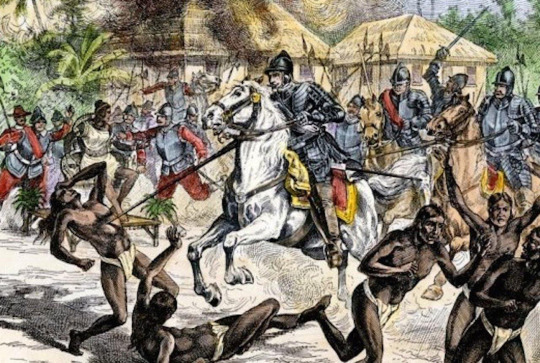

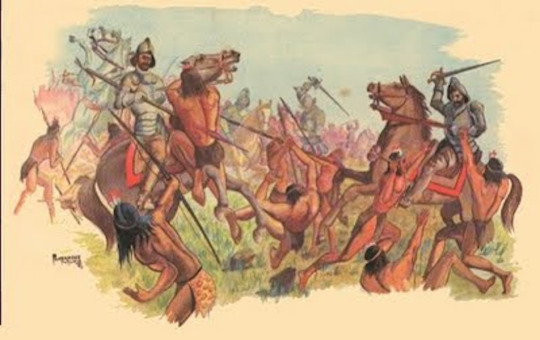




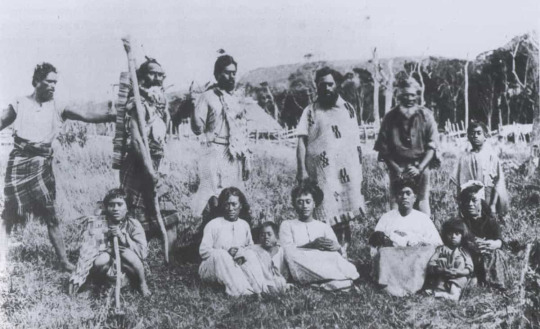

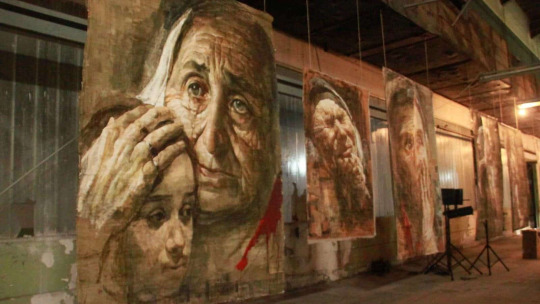
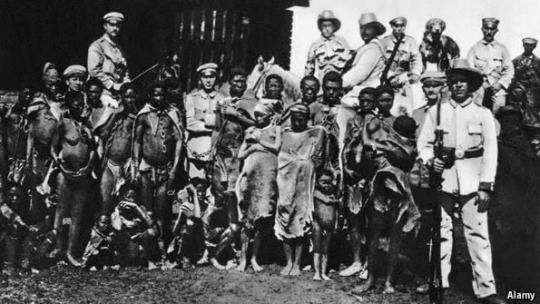


Palestine will be free.
Who Remembers the Armenians?, Najwan Darwish / Myth of the Vanishing Indian, Rena Priest / Shadow Procession, William Kentridge / The Wretched of the Earth, Frantz Fanon / Darfur (Jesus Wept), William F. DeVault / Srebrenica, Safet Zec
#web weave#web weaving#webweaving#palestine#israel#israel palestine conflict#palestinians#gaza#middle east#crusades#armenia#armenian genocide#bosnian genocide#native american#native genocide#the black war#black war#massacre of salsipuedes#moriori genocide#herero and namaqua genocide#herero#namaqua#poetry#poems#colonialism#colonization
301 notes
·
View notes
Text

Time and time we say again population decrease/growth is not the prime indicator to determine whether genocide has taken place. When international researchers determine whether genocide has or is taking place they look at the intent of the perpetrators to commit genocide. It does not need to be "successful" for it to have occurred. Do you think genocide researchers are biding their time waiting for the death count to increase in order to prove that genocide is occurring?? Against a group of the same nationality?? There are precursors to genocide it is orchestrated it is planned it is carried out. These are the factors taken into account and if the people are not killed in the millions it does not negate whether a genocide happened. You just need intent. The definition starts with intent to commit the crime not whether the crime has been committed after the fact
Jesus these are the same lines to disprove the Bosnian and Armenian genocide are these people okay??? (They're not)
172 notes
·
View notes
Note
Your comics are cool. Have you seen the dog spirit aralez? I think you would like it. It’s an old Armenian myth. I grew up hearing stories about them and ara mountain. They’re spirits that take the shape of winged dogs, descending onto the battlefield to revive fallen and injured soldiers by licking their faces.
They appear in the story of ara the beautiful. The story of ara the beautiful goes like this. Well, there’s tons of different versions, but I was raised with this one.
Ara the beautiful was an Armenian king, who was prettier than all others. The queen shamiram fell in love with him, but he refused her advances. In retaliation, she rallied her troops against Armenia. She won the battle, but ara died in battle. Shamiram was devastated. Shamiram brought ara up the mountain (later named ara’s mountain) for him to be revived by the aralez, but they never came. But shamiram didn’t want any more war with Armenia, and knew they’d want to avenge their leader. So she disguised her lover as ara, and told the Armenians that he’d been brought back to life, avoiding the war.
Something about the story reminds me of your comics. In a good way. The tragedy of ara dying for the simple reason that he didn’t love shamiram. The tragedy of shamiram accidentally causing the death of the one person she wanted alive. The tragedy of the spirits choosing not to come. The ending, which is bittersweet: a war is avoided, through deception. Or maybe it’s just something about flying dogs. Whatever it is, it’s wonderful, and reminds me of your art.I hope you have a wonderful day.
I've never heard of this story and I like it a lot, thank you for sharing it. I have some old stories lined up for we go together, but I might do some research into this and draw it sometime in the future! I'm really flattered you think something this interesting has the same vibe as my stuff
I hope you have a good day too!!

57 notes
·
View notes
Text
reading updates: september 2023
AHOY EVERYBODY!!! the end of the month has really crept up on me and lo, I have no finished as many books as I thought I would by this point! but so it goes.
also I'm fighting for my life trying to get through all of the library books I have checked out, which is a bummer because there are a bunch of creepy books I want to start reading for Spooky Month! but time is an illusion and I've already made my peace with Spooky Month extending into November, so whatever happens happens, babey! but that's the future, right now we need to talk about what I've been reading for the past month.
A View from the Bottom: Asian American Masculinity and Sexual Representation (Nguyen Tan Hoang, 2014) - Nguyen's dissertation is a really fascinating piece of queer scholarship, which gets deep (pun somewhat intended) into forms of media often overlooked by academia - gay porn, softcore art films, gay indie documentaries - in search of a new understanding of Asian masculinity and bottomhood. I really like Nguyen's thoughtful study of bottoming, effeminacy, and sexual abjection, all of which he's pretty in favor of, balanced with analyses of the factors of race, class, nationality, and citizenship that complicate how gay Asian men are perceived. it's wide-ranging, it's meticulous, it's kind of hot? I love you, queers in academia.
"You Just Need to Lose Weight" and 19 Other Myths About Fat People (Aubrey Gordon, 2023) - god, okay, listen: this book was a little dry TO ME but ONLY BECAUSE I have already spent years listening to Aubrey Gordon discuss all 19 of these myths and a bunch of other shit on her excellent podcast, Maintenance Phase. if you don't listen to Maintenance Phase either start doing that or read this book! which is extremely well-researched and great for debunking pretty much every "justification" a person might off to try and make their fatphobia sound reasonable. frankly if I could load up copies of YJNTLW into, like, a t-shirt gun to just have on standby to fire at people, I would do that.
Sorry, Bro (Taleen Voskuni, 2023) - yeah you all already know about this book, which is the one in which a 27 year old brings the narrative to a screeching halt to assure the readers that it's okay for her to hook up with a 31 year old woman because despite the so-called age gap both of their brains are fully-cooked. that's not actually the worst part of this book; the worst part is that the prose is unpolished in the extreme and the main character is kind of a dumb asshole. cannot say I recommend it, no matter how desperate you may be for bisexual Armenian representation.
Brown and Gay in LA: The Lives of Immigrant Sons (Anthony Christian Ocampo, 2022) - I really like the way Ocampo writes his nonfiction, which is very chatty and extremely accessible (if a little prone to editorializing). I love seeing sociologists writing from the community the community they live in, and these interviews come from second generation queer Latino and Filipino men frequenting the same LA clubs and coffee shops as the gay second gen Filipino author. it kills the presumed spectator that a lot of writing on marginalized communities can fall victim to; here, it's not that brown gay men need to be explained, but rather outsiders who need to make the effort to keep up with their lives. I especially appreciated Ocampo's highlighting the disparity between Latino and Filipino men's experiences in education, where very different sets of racial stereotypes impact their ability to succeed in white-dominated school systems; if you're curious about why Latino and Filipino men are categorized together at all in this study I strongly recommend Ocampo's other book, the Latinos of Asia.
The Vanishing Half (Brit Bennett, 2020) - it's always kind of astonishing when something that was extremely hyped-up and buzzy turns out to actually be as good as all that, and the Vanishing Half really was that good. the premise of two light-skinned Black twins separating so that one can "pass over" and live her life as a white woman is compelling all on its own, but Bennett is so committed to every possible angle of this premise: what does it mean to live more than one life? what other ways are people more than one person? it shows up everywhere through this novel: in losing your twin, in transing your gender, in drag performances, in actors, in people moving to new towns where no one knows them and becoming someone else. the moment it really hit me that Bennet Got It was a completely innocuous sentence that identified a Korean restaurant owner in California as a man who had attended medical school in Korea - even this background character, who we'll hardly hear from again, has been a different person in a different life! everyone has these layers and layers and different sides of themselves and it's just beautifully executed. mwah. chef's kiss.
37 notes
·
View notes
Text
Anon: but... but... the Gaza attack was due to 75 years of colonization......!
Me: Well gee, I guess the Armenian genocide ought to be considered in the context of…the previous 1500 years of Armenian Christianity’s existence, and 450 years of non-Muslim Armenians living peacefully under Ottoman rule and paying a special tax in order to do so. And while we're on that subject, I guess the Omagh bombing, which killed 29 people including non-Protestants and non-English people, should be considered in the context of 800 years of British political and military involvement in Ireland. And I suppose the Cambodian genocide has to be considered in the context of centuries, if not millennia, of class warfare which preceded it. Or something.
Fucking. Bull. Shit.
And let's not forget an important fact, immediately after the U.N created the partition, Jordan annexed Palestine (Jordanians and Palestinians are the same people living in different locations). So Palestine never actually technically existed. It was only after the Jordanians got their asses kicked twice in wars they started with Israel that Jordan gave up and renounced the "Palestinians" citizenship. The terrorist Yasir Arafat, in a remarkably successful P.R. move then decided to create this new myth of a Palestinian People with Israel as its homeland.
This is the translated meme that gets passed around in the Arab nations mocking the gullible liberal Westerners like you for falling for Arafat lies.
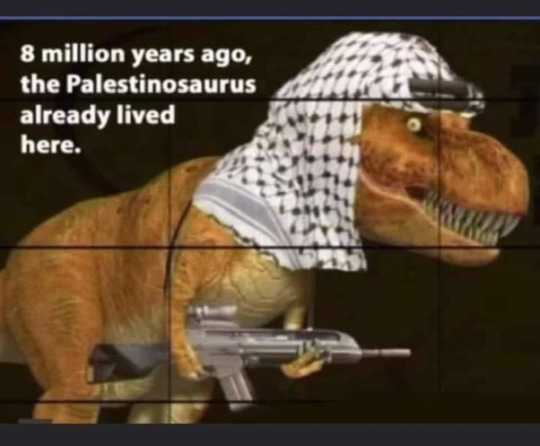
Now Anon, try to imagine Mexicans get uppity over losing territory to United States of America and begin a campaign of terror against the USA. Mexico launches missiles across the border wall into San Diego, Tuscon, San Antonio and more. They dig tunnels under the border wall and generally make themselves a pain in the ass.
But this time they launched a full scale incursion, took over several border towns, massacred most of the population and took the rest as hostages back into Mexico. They post videos online of raped and tortured hostages, who only barely cling to life. Mexicans now say they will start killing hostages, unless USA abandons New Mexico, Arizona, Texas, California and Nevada and calls on the entire world to join in their crusade.
How do you think the USA would respond to that? Hmmmm?
You can switch countries if you want. Russia took land from Finland, China from Tibet, India and Pakistan have their antics, there’s the perpetual issue of Western Sahara and so on. Can you think of one example, only one example, where the response would be more restrained, if a militarily weaker force did that to a larger, stronger neighbor in such a manner? All it takes is one.
25 notes
·
View notes
Text
Tankies are now blithely engaging in Holocaust inversion, claiming that the idea that European antisemitism *wasn't* limited solely to the Shoah is a "myth", and claiming that the idea that there was indeed antisemitism in SWANA before Zionism was a "myth".
Facts:
- both Christian Europe and Muslim/Arab SWANA were massively antisemitic for over a thousand years, and this had nothing to do with and was not caused by Zionism
-- the Umayyads were actually the ones who invented the "Yellow Badge" usually associated with the NSDAP
-- there were pogroms, oppression, massacres, supression, and forced conversion of Jews up and down Europe and SWANA for thousands of years
- The Holocaust/Shoah was not the reason Israel was created (see: founders of Zionism in 1830s; Dreyfus Affair)
- "Zionist" as a label was used by Stalin to repurpose NSDAP antisemitic propaganda for his own purposes, and this is generally how tankies use it today.
- in addition to the European imperial powers, the Ottoman Empire\Turkey shares a lot of the blame for how the region currently is
- that this region had a large Arab population at all is also a result of colonialism, namely by the Caliphates
- there are other supressed native peoples in SWANA, for example the Amazigh, Assyrians, Armenians, native Egyptians, Kurds, Druze, Mandeans, and others. People who purport to be anti colonialism should also care about them.
- none of this justifies Israel, its racist government and leaders, and its current and continuing campaigns against civilians who have not participated in Hamas' violence
#hibiki//discourse#antisemitism#leftist antisemitism#tankie punks fuck off#world history#free palestine#free artsakh#israel palestine conflict
30 notes
·
View notes
Text
scars
Less than a week. Thirty-five years of war
ended … like that. Already its become
myth. Lands none can return to; one more scar
for the soul. Scars … and the narcissism
that nostalgia brings will be the headstone
on my grave. Holy mountains I'll never
return to. “Artsakh” comes out like a moan
each time I say its name. You're dead, lover,
buried near Shusha. “Lick me,” you had said,
one of the things that your husband refused
to do; your tickled pink. Now all Artsakh
has been abandoned along with its dead.
Less than a week. All that forfeited blood
festering. The reek of yearning and shock.
notes.
Shusha is a city in the Southern Caucasus Karabakh mountains (also known as Nagorno-Karabakh). The Republic of Artsakh has, since the fall of the USSR, been fighting for their right of self-determination against their neighbor, Azerbaijan, which sees the entire region as part of its own.
Now [10/4/2023] a week has passed since the ethnic Armenians of Artsakh agreed to a ceasefire, agreeing that by the New Year the Republic will cease to be. It has been estimated that within 48-hours of that declaration more than 100,000 citizens have fled Artsakh, leaving behind everything. I'm not Armenian but this loss and the dread of what horrors might entice an entire population to leave has consumed all my days of late, my dreams, my disbelief.
24 notes
·
View notes
Text
I’ve started watching X-Files (because it’s paranoid narratives riffing on American conspiratorial tendencies, like Homestuck, and Jude watches it) and it turns out the immortal sewer man episode I’d heard about fairly directly frames its genetic mutant who achieves immortality through bursts of mass slaughter as a modern myth arisen from reaction to 20th century genocides -- the Holocaust and Armenian genocides are invoked alongside the sewer man’s crimes on several occasions, and they named this Evolved motherfucker “Eugene Tombs” to make sure his murderous birth cycle gets keyed in as an allegory of Eugenics.
22 notes
·
View notes
Text
CAUCASUS & IRANIAN RESOURCES
The Anthropological Masterlist is HERE.
The Caucasus, or Caucasia, is a region that serves as a barrier between East Europe and West Asia.
ARMENIA ─ “The Armenian people are a West Asian people. They are native to the Armenian Highlands.”
─ Armenian Literature
─ Armenian History
─ Armenian Dictionary
AZERBAIJAN ─ “The Azerbaijani, or Azeri, people are a Caucasian and Turkic people. They are native to the Republic of Azerbaijan and northwestern Iran.”
─ Azerbaijani Culture
─ Azerbaijani Literature
─ Azerbaijani History
CIRCASSIA ─ “The Circassians, or the Adyghe, are a Caucasian people. They are native to Circassia in the North Caucasus.”
─ Circassian Information
─ Circassian Dictionary (Pages 229 - 430)
─ Circassian Re-Immigration to the Caucasus
GEORGIA ─ “The Georgians, or Kartvelians, are a Caucasian people. They are native to Georgia and the southern Caucasus.”
─ Georgian Culture (in German)
─ Georgian Mythology
─ Georgian Dictionary (in Georgian)
URARTU ─ “Urartu, or the Kingdom of Van, was a West Asian civilization that lived from 860 B.C.E. to 590 B.C.E. They lived in the Armenian Highlands.”
─ Urartian Information
─ Urartian History
VAINAKH ─ “The Vainakh, or Nakh, people are a Caucasian people. They are native to the North Caucasus.”
─ Ingush Information
─ Nakh Language
Iran is a West Asian country that is bordered by Iraq and Turkey. It is home to some of the oldest civilizations and most prolific cultures.
INDO-IRAN ─ “The Indo-Iranian, or Aryan, people are an Indo-European people. They are native to Western Asia and eastern Anatolia.”
─ Indo-Iranian Mythology
─ Indo-Iranian Dictionary
OSSETIA ─ “The Ossetians, or Ossetes, are an Iranian people. They are native to Ossetia.”
─ Ossetian Information
─ Ossetian Language (in Russian)
PERSIA ─ “The Persian people are an Iranian people. They are native to Iran.”
─ Iranian Culture
─ Persian Literature
─ Persian Dictionary
SCYTHIA ─ “The Scythian people were a nomadic Iranian people that lived from the 7th century B.C.E. to the 3rd century B.C.E. They lived in Ukraine and southern Russia.”
─ Scythians and the Achaemenid Empire
─ Origin of the Scythians Myth
YAZIDI ─ “Yazidism, or Sharfadin, is an Iranian religion. It originates in Kurdistan.”
─ Yazidi Information
─ Yazidi Culture
─ The Yazidi Black Book
ZOROASTRIANISM ─ “Zoroastrianism is a Persian religion. It originates in Iran.”
─ Zoroastrian Information
─ Zoroaster Information
─ Avesta
#resources#caucasus#iran#armenia#azerbaijan#circassia#georgia#urartu#vainakh#indo-iran#ossetia#permanent slave#scythia#yazidi#zoroastrianism
145 notes
·
View notes
Note
i mean as an indigenous person, the domari people and the armenian diaspora in palestine are just as indigenous as palestinians. indigneity is produced via a relationship to an oppressive, colonizing entity, not "who lived here the longest"
I don't disagree with you exactly, but colonization is also layered.
So bear in mind that my knowledge of decolonization is specifically subaltern (as in the Indian subcontinent) and patchy (disabled my whole adult life and a very start-stop-stagnate tertiary education). The Americas might be different. I'm completely open to being wrong.
In Sri Lanka, the Sinhalese and Eelam Tamils are "natives" while "indigenous" are considered the Adivasi and Tamil Indigenous people in the North (I'm sorry I can't remember their names, only found out about them last year). The distinction arises because they were Austroasiatic people (and the Tamils were maybe Dravidians? Wow, ethnosupremacist black hole discovered) who arrived in migrations millennia before they were colonized by later migrants from the Indian subcontinent about 2500 years ago. Those are the progenitors of both the later Sinhalese and Tamil kingdoms. (Obviously both intermarried with the indigenous populations; ethnic identities are cultural). The Adivasi never assimilated into the Indian migrants' agrarian societies. They still engage in hunting and subsistence agriculture rooted in the ecosystems of their ancestral lands. Unlike the rest of the population, being transplanted from these lands to anywhere else in the country would result in a devastating loss culture and community.
"Indigeneity" is an extremely fraught topic in post-colonial nations when conflated with being "native". It erases the actual pre-agrarian tribes that were victims of colonization two or three times over, and is used for nationalist ethnic cleansing and the creation of ethnic underclasses. The myth that all Tamils were descendants of "Chola invaders" that arrived only a thousand years ago is foundational to Sri Lanka's Tamil genocide. Eelam Tamils themselves heavily discriminated against the Malaiyyah Tamils the British enslaved and exported from India to work their cash crops (Indian Ocean slavery is as brutal and horrific as the trans-Atlantic one). The persecution of Muslims who migrated here the last few centuries from South India, Afghanistan, Turkey and Malaysia also involves seeing them as interlopers, even though they never claimed to be native because their ethnic identities are shaped by their migrant roots and the unique ways they assimilated into Sri Lankan society. They still have ancestral lands here from which they've been ethnically cleansed and are still under threat by both Sinhalese and Tamils.
I'm not sure whether this is something unique to countries where the Europeans actually did fuck off forever. But if even if they never did, how do we discern our layers of colonization and oppression if we all believe we're indigenous? Do we ignore that the pre-agrarian societies* here are rooted primarily in the custodianship and protection of their ancestral lands, unlike the rest of us that thrive in mono-agriculture, industrial encroachment and urban sprawl (and constant ethnic violence)? Do we have to center European violence in our own understanding of ourselves and our responsibilities to acknowledge the histories and rights of minorities vulnerable to us?
To my understanding, the difference between "anti-colonial" and "decolonial" is that one is conceptualized as "resistance" and the other as "re-existence". What I've been taught is that seeing our place in the world through the white colonial lens and defining ourselves by colonial proximity is to give up our power of self-determination. We were native to this island before these violent borders imposed on us by the British ever existed, and we were native whatever kingdoms configured and reconfigured themselves over millennia. But we have also been violent colonizers of the people who were here before us, even during and after the Europeans came and went. Indigeneity afaik is acknowledging their identities and respecting the history that formed them, and the restoration of their long-obscured sovereign right to their lands independent of the nation state.
*I can't remember whether pre-civilization was a problematic term or not. I took like two modules on subaltern indigenous peoples five years apart lol.
#knee of huss#decolonization#indigenous rights#indigenous peoples#anarchism#i'm sorry but you have to be an anarchist to be decolonial#indigenous#sri lanka#subaltern#asks#anon
5 notes
·
View notes